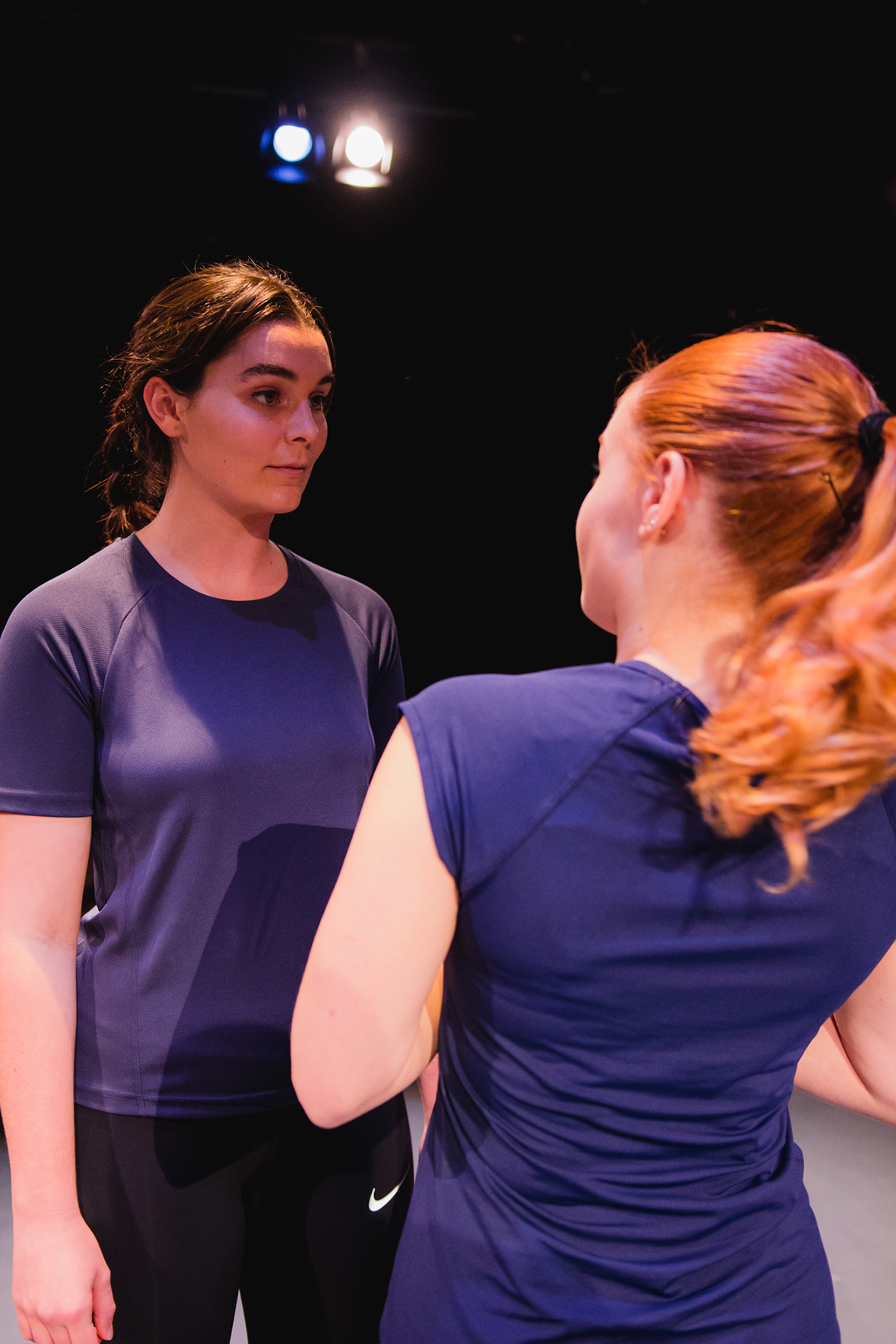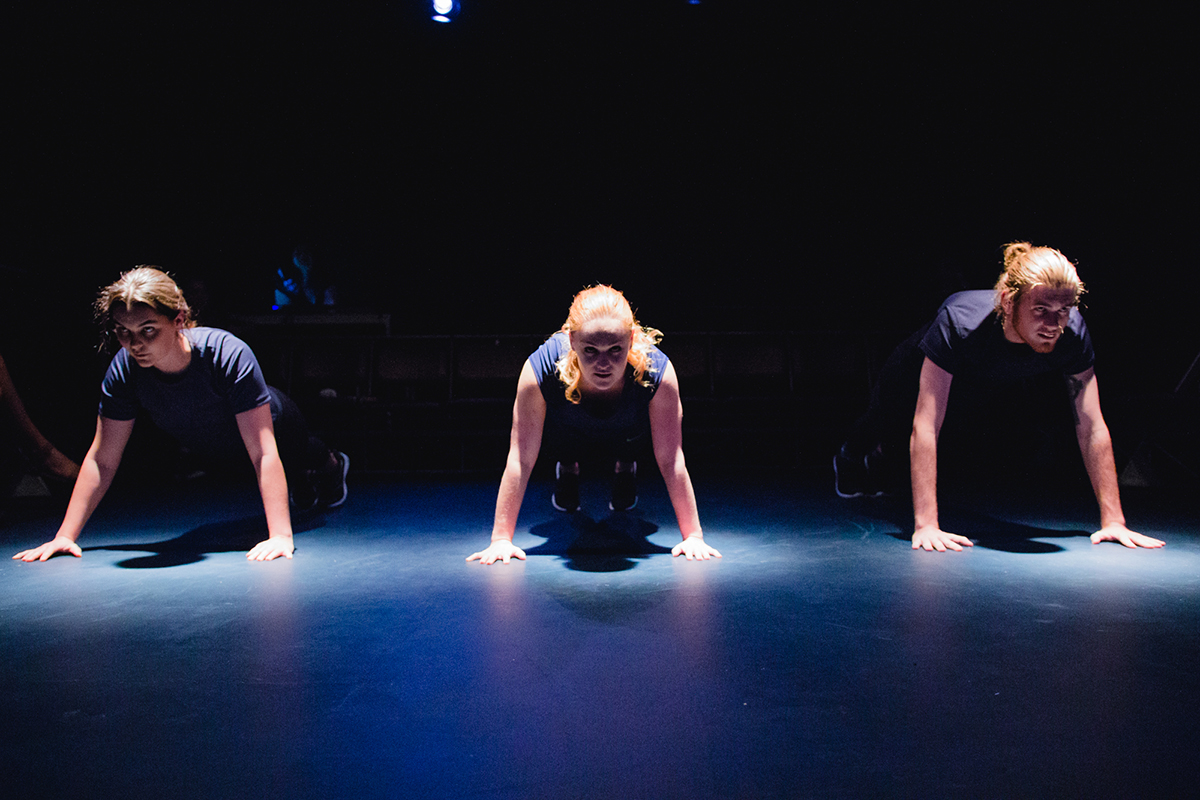
The performance makers: Jessica Russell, Phoebe Sullivan
Jessica Russell, Phoebe Sullivan and Sean Crofton’s Rocketman was the trio’s graduating performance for the Bachelor of Performing Arts in Performance Making degree in 2016. Further developed and retitled as Blueprint it excited interest when staged at Perth’s The Blue Room Theatre in June this year.
Our reviewer, Nerida Dickinson, outlined Blueprint’s fascinating scenario. “Successful in a competitive selection process, three candidates undergo a series of experiments to enable space travel and eradicate all the afflictions that have ever plagued humanity. Volunteering to establish the first colony on Mars, Alex (Russell), Lewis (Crofton) and Jane (Sullivan) maintain strict physical discipline while undergoing enhancements in breathing efficiency, boosted skin resilience and bones made unbreakable. Impatient for the application of genetic modification improvements, bickering and plagued by nightmares and regrets, the rigours of the enforced artificial confinement prove too much for Lewis and Jane, leaving a determined Alex to join candidates trained elsewhere.”
Dickinson praised the blend of physical theatre and text: “Impressive extended skipping rope sequences feature the performers delivering text without a hint of breathlessness, while vigorous, stylised aerobic workouts immediately precede extended ethical debates, the onslaught of words and scientific concepts mirrored by punishing physical exertion. The ensemble’s careful choreography offers visual impact from all directions.”
Via email, I asked Jessica Russell and Phoebe Sullivan about their training, their aspirations and the experience of mounting the self-devised Blueprint at The Blue Room.
Russell writes that after working together for a year and a half on Blueprint, “Phoebe and I have this running joke that we can’t get rid of one another. So while (for now, never say never) Blueprint has been put to bed, I’m sure we’ll work together again soon. Phoebe’s an incredible collaborator, but we also respect each other’s interests and practices as individual artists.” Sullivan thinks that Blueprint, a work about adaptations for space travellers’ bodies, might have a longer life: “The bio-engineering technology which the show refers to is constantly developing, and because of this, so too can Blueprint.”
After working behind the scenes on three productions at The Blue Room, Russell writes, “rather than becoming trapped solely in the arts, I’m taking some time out to read and research a whole array of ideas beyond theatre. Work comes from the world around us, you have to stay connected. Also, I’m trying to remember that making work takes time, rather than falling into the trap of making work solely for the purpose of making work.”
Sullivan is likeminded: “For me, trying to create anything semi-decent while stressed is like slowly pulling splinters out from underneath my fingernails, and I absolutely refuse to have a mental breakdown at the age of 25 and burn out completely by the time I’m 30.” She’s landed a three-month residency from pvi collective for the development of a new physical theatre work with “a lot of on-the-floor improvising to generate material… It’ll be exciting to fall back into a familiar process and refine it for myself even further.”
Learning from the work
I asked the pair about what they learned from mounting Blueprint. Russell writes, “It was an invaluable experience. Throughout the run, Phoebe and I had plenty of ‘Ohhh, it’s so obvious’ moments when we realised exactly where we’d edit or add to the work. We accepted those moments for the incredible learning they provided.” Sullivan believes “the show could definitely have done with more refining structurally in terms of the play’s narrative and the journey it needed to take our audiences on. Though, this is borne out of a personal response to the work, as opposed to being influenced by public opinion. Although I agree with some audience feedback from an artistic point of view, I’m not really looking to make a crowd pleaser; the same goes for reviewers.” Russell likewise thinks that taking on responses “is a fine balancing act,” but helpful in respect of achieving clarity: “What ideas are not translating to the audience, and what could be causing it — scene structure, character narrative, physicalisation?”
Preparedness
I asked about the pair’s preparedness for their first professional production. Russell writes, “WAAPA’s training was invaluable, I found myself putting teaching into practice almost subconsciously. I still carry my third year notebook, still filling it with notes on process and work, continually going back to the earlier pages to reread notes from my mentors. More than anything, WAAPA gave me a hunger to continue to learn in this industry, to take up opportunities that challenge me.” Sullivan says of the third year of her course, “It was thrilling being given free rein to tackle such large scale ideas concerning humanity, the environment and the survival of a species. The course certainly prepared me to be flexible and adapt to the oncoming changes. As well as being cost efficient in the process! The transition was made so much easier by the supportive team at The Blue Room Theatre.”

Jessica Russell, Phoebe Sullivan, Sean Crofton, Blueprint, The Blue Room Theatre, photo Marshall Stay
Skills & attitude
On the subject of the skills and the attitudes developed at WAAPA, Russell writes, “Apart from the drive to continue learning my craft, WAAPA has improved upon my skills tenfold. I have a much stronger sense of my work ethic and process, a belief in my abilities as both maker and performer, but also the self awareness that this is a long journey.” Sullivan comments, “It’s so funny how many conversations I’ve had with friends, who have also graduated with similar performing arts degrees, about how drama school fast-tracks your personal development so that you leave with a much more informed opinion of who you think you are. I only say ‘think’ because every time I claim to know who I am, I then do something which proves me wrong. Skills, resilience and courage are certainly tools you gain while studying at WAAPA and that really does set you up for the industry.”
Into the future
I wondered if the two performance makers saw their careers as developing in Perth or beyond. Russell, who trained as a dancer for a number of years, says that thanks to the course, she “became passionate about how movement interacts with text, how in contemporary theatre practice a movement director is an invaluable presence in any rehearsal room. I’m inspired by companies such as Punchdrunk and Frantic Assembly, so, with any luck, one day I’ll be at the helm of a similar company. I’m personally really drawn to the UK, but I believe there’s a huge stirring in Perth for physical theatre. Audiences are becoming hungry for new practices and styles, which both The Blue Room Theatre and WAAPA are accommodating so wonderfully.” Sullivan, attracted to the programs offered by STRUT Dance in Perth and inspired by the likes of Force Majeure and Chunky Move in Sydney and Melbourne, hopes “to create work that positively contributes to the discipline.” A Queenslander, she is now committed to Perth; “it’s transformed into home for me,” though London and Berlin and postgraduate study there beckon, if a while off.
–
Find out about the Bachelor of Performing Art in Performance Making at the Western Australian Academy of Performing Arts, Edith Cowan University.
Top image credit: Jessica Russell, Phoebe Sullivan, Blueprints, photo Marshall Stay






